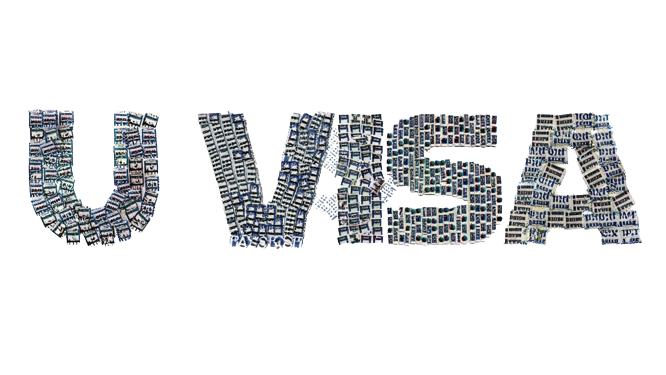U VISA QUESTIONS
Questions & Answers: U Nonimmigrant Status What forms do I need? Principal Applicants: ► Form I-918, Petition for U Nonimmigrant Status ► Form I-918, Supplement B, U Nonimmigrant Status Certification ► Form I-192, Application for Advance Permission to Enter as a Nonimmigrant (if your client is inadmissible under any ground found at INA § 212(a)) ► Form I-912, Request for Fee Waiver (if your client requires a waiver of the Form I-192 filing fee) Derivative Applicants: ◊ Form I-918A, Petition for Qualifying Family Member of U-1 Recipient ◊ Form I-192, Application for Advance Permission to Enter as a Nonimmigrant (if derivative is inadmissible under any ground found at INA § 212(a)) ◊ Form I-765, Application for Employment Authorization (filed for derivative applicant only; not needed for principal) ◊ Form I-912, Request for Fee Waiver (if your client requires a waiver of the Form I-192 and/or Form I-765 filing fee) Can I get a waiver of the filing fee? U Visa applicants can request a fee waiver for the I-192 and I-765. There is no fee for the I-918 and I-918A, and thus, no need for a fee waiver. NOTE REGARDING I-192 FILING FEE: See Notice of Settlement Agreement in Vangala v. U.S. Citizenship and Immigration Services, No. 4:20-cv-08143 (N.D. Cal.)) A request for a fee waiver should be made on Form I-912. USCIS will exercise its discretion to grant a fee waiver when an applicant: a) is receiving a means-tested benefit, b) has a household income of 150% or below of the poverty guidelines, or c) can demonstrate financial hardship. You can claim eligibility for a fee waiver on multiple grounds. You should submit evidence in support of your request for a fee waiver. Typically that evidence will include: tax returns, pay stubs, utility bills, rent receipts, medical bills, etc. TIP: You should note on the cover letter that you are requesting a fee waiver so USCIS doesn’t automatically reject your submission as missing the filing fee without seeing that you were requesting it be waived. Does the Form I-918, Supplement B, U Nonimmigrant Status Certification expire? The Form I-918, Supplement B, is valid only six months from the date of certification. What happens while I am waiting for my I-918 to be adjudicated and for visas to be available? Read about the bona fide determination process for Form I-918 nonimmigrant visa petitioners. As a U nonimmigrant when can I apply for lawful permanent residence? Pursuant to INA § 245(m), a U nonimmigrant must be able to demonstrate three years of continuous physical presence in the United States, in valid U nonimmigrant status, in order to be eligible to apply for lawful permanent residence. What other requirements are there for legal permanent residency based on U nonimmigrant status? According to INA § 245(m) a U nonimmigrant must also be able to demonstrate that: The applicant is not inadmissible under INA § 212(a)(3)(E); The applicant has not unreasonably refused to provide assistance to an official or law enforcement agency…after the alien was granted U nonimmigrant status, as determined by the Attorney General, based on affirmative evidence; and A favorable exercise of discretion is “justified on humanitarian grounds, to ensure family unity, or is in the public interest.” My U visa was granted but why does my U nonimmigrant status and employment authorization document (EAD) expire in four years? U nonimmigrant status is issued for a maximum period of four years under 8 C.F.R. § 214.14(g)(1). Why were my derivatives granted U nonimmigrant status for less than four years? Derivative U status (U-2, U-3, U-4, and U-5) cannot be granted for a period not to exceed the initial grant period of the principal U applicant (U-1). What if a derivative is granted U nonimmigrant status for less than three years and therefore won’t enough time in U nonimmigrant status to be able to adjust with the principal? The derivative may be eligible to extend their U nonimmigrant status allowing them to accrue the three years they need in U status needed for adjustment of status to legal permanent resident. Can I obtain employment authorization being in U nonimmigrant status? The regulations providing eligibility for employment authorization are found at 8 CFR § 274a.12: (a)(19) – an alien in valid U-1 nonimmigrant status (a)(20) – an alien in valid U-2, U-3, U-4, or U-5 nonimmigrant status If my U visa is approved can I travel outside the US? This is a somewhat complicated question and you can read more about traveling abroad with an approved U visa here. Individuals in U nonimmigrant status are eligible to apply for a U visa abroad at a U.S. consulate and may be able to use that visa to reenter the United States after a trip abroad. It is highly likely that any travel outside the US would raise issues with unlawful presence bars since the recipient of U nonimmigrant status most likely accrued unlawful presence in the United States. You would need to talk with an immigration attorney to determine if it is possible in your particular case but typically it would not be advisable. If USCIS already met its cap on U Visas for 2023 when does the next year start? When the new fiscal year begins on October 1, 2023, USCIS will resume approving principal petitions for U-1 nonimmigrant status starting with petitions filed on or before July 31, 2016, prioritizing the oldest petitions. What is the Bona Fide Determination Process and how does that work? To learn about the bona fide determination process and how USCIS processes Form I-918 petitions for U Nonimmigrant status as well as what happens to applicants waiting years for their U visas to get approved please visit that FAQ page.

